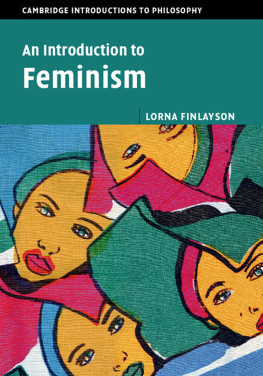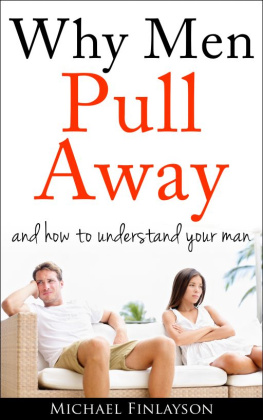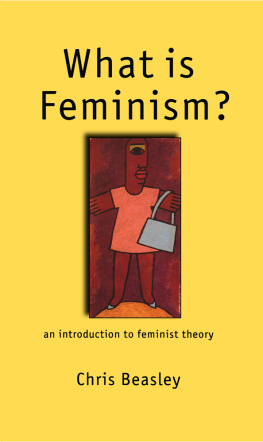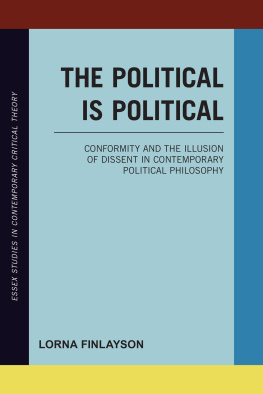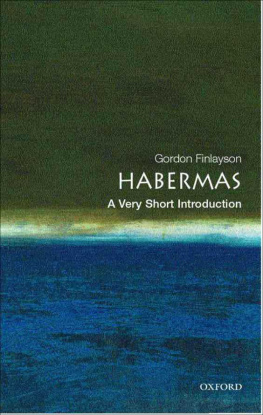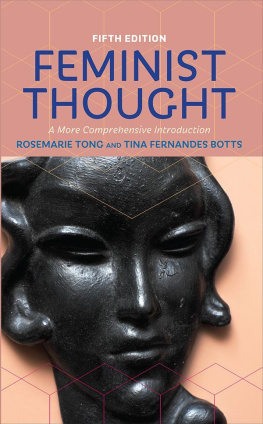Finlayson - Introduction to Feminism
Here you can read online Finlayson - Introduction to Feminism full text of the book (entire story) in english for free. Download pdf and epub, get meaning, cover and reviews about this ebook. year: 2016, publisher: Cambridge Univ Pr, genre: Romance novel. Description of the work, (preface) as well as reviews are available. Best literature library LitArk.com created for fans of good reading and offers a wide selection of genres:
Romance novel
Science fiction
Adventure
Detective
Science
History
Home and family
Prose
Art
Politics
Computer
Non-fiction
Religion
Business
Children
Humor
Choose a favorite category and find really read worthwhile books. Enjoy immersion in the world of imagination, feel the emotions of the characters or learn something new for yourself, make an fascinating discovery.
- Book:Introduction to Feminism
- Author:
- Publisher:Cambridge Univ Pr
- Genre:
- Year:2016
- Rating:5 / 5
- Favourites:Add to favourites
- Your mark:
- 100
- 1
- 2
- 3
- 4
- 5
Introduction to Feminism: summary, description and annotation
We offer to read an annotation, description, summary or preface (depends on what the author of the book "Introduction to Feminism" wrote himself). If you haven't found the necessary information about the book — write in the comments, we will try to find it.
Finlayson: author's other books
Who wrote Introduction to Feminism? Find out the surname, the name of the author of the book and a list of all author's works by series.
Introduction to Feminism — read online for free the complete book (whole text) full work
Below is the text of the book, divided by pages. System saving the place of the last page read, allows you to conveniently read the book "Introduction to Feminism" online for free, without having to search again every time where you left off. Put a bookmark, and you can go to the page where you finished reading at any time.
Font size:
Interval:
Bookmark:

An Introduction to Feminism
As well as providing a clear and critical introduction to the theory, this refreshing overview focuses on the practice of feminism with coverage of actions and activism, bringing the subject to life for newcomers as well as offering fresh perspectives for advanced students. Explanations of the main strands to feminism, such as liberalism, sit alongside an exploration of a range of approaches, such as radical, anarchist and Marxist feminism, and provide much-needed context against which more familiar historical themes may be understood. The author's broad and inclusive view conveys the diversity and disagreement within feminism with accessible clarity. The analysis of key terms equips readers with a critical understanding of the vocabulary of feminist debates that will be invaluable to undergraduate students.
Lorna Finlayson is Lecturer in Philosophy in the School of Philosophy and Art History at the University of Essex. She is the author of The Political Is Political: Conformity and the Illusion of Dissent in Contemporary Political Philosophy (2015).
An Introduction to Feminism
Lorna Finlayson


University Printing House, Cambridge CB2 8BS, United Kingdom
Cambridge University Press is part of the University of Cambridge.
It furthers the University's mission by disseminating knowledge in the pursuit of education, learning and research at the highest international levels of excellence.
www.cambridge.org
Information on this title: www.cambridge.org/9781107544826
Lorna Finlayson 2016
This publication is in copyright. Subject to statutory exception and to the provisions of relevant collective licensing agreements, no reproduction of any part may take place without the written permission of Cambridge University Press.
First published 2016
Printed in the United Kingdom by TJ International Ltd. Padstow Cornwall
A catalogue record for this publication is available from the British Library
ISBN 978-1-107-12104-1 Hardback
ISBN 978-1-107-54482-6 Paperback
Cambridge University Press has no responsibility for the persistence or accuracy of URLs for external or third-party internet websites referred to in this publication, and does not guarantee that any content on such websites is, or will remain, accurate or appropriate.
First thanks go to Koshka Duff, Katharine Jenkins, Basim Musallam and two referees for Cambridge University Press, all of whom read drafts of this book in their entirety and provided invaluable feedback. I am also grateful to Mezna Qato and Eva von Redecker for comments on parts of the text, and to Natalia Baeza, Nick Bruton, Tim Button, Tessa Frost, Amelia Horgan, Lucy McMahon, Eva Nanopoulos, Remi Oriogun-Williams and a number of seminar participants at the Universities of Cambridge and Sussex for useful discussion of some of the ideas of this book. Finally, my thanks to Hilary Gaskin and Rosemary Crawley at Cambridge University Press for all their help and advice, and to Daisy Hughes for her work on the index.
There are lots of introductions to feminism, and many of them begin by pointing out that there are lots of introductions to feminism. Then they normally say how the present book is special and different. So I will now try to do that.
Much contemporary feminist political philosophy belongs squarely within a liberal framework. Students unfailingly learn about John Stuart Mill, sometimes with almost the idea that he was feminism's founding father. They learn about gender justice, and about the attitudes that liberals should take towards the family, if they are to be good feminists as well as good liberals. They are asked to consider whether the liberal commitment to an attitude of tolerance towards cultural minorities is compatible or incompatible with the liberal feminist commitment to women's autonomy and equality. They also consider whether the liberal commitment to freedom of speech is compatible with feminist critiques of pornography.
I don't want to ignore these familiar debates and questions, but I do aim to provide a different and more distanced take on them, asking about the presuppositions and hidden implications of the way in which these debates and questions are selected, set up and presented. I also want to pay attention to some of the many facets of feminism that are neglected by the standard treatments. For example, I devote a larger portion of the space than is usual, for an introductory text, to the relationship between socialist or Marxist ideas and feminist ones. I also include a chapter dealing with anarchism and anarcha-feminism. If Marxism and socialism are side-lined in mainstream political philosophy, including mainstream feminism, anarchism is often virtually invisible perhaps because it is thought too obviously stupid or impractical to deserve serious consideration. But perhaps the most important respect in which my discussion differs from the mainstream liberal approach to feminism (and to political philosophy in general) is in the much heavier emphasis I'll place on practice : on the actions and activism that make up a crucial part of what feminism is and has been. Feminism is not just a body of theory. Just as socialism was for Marx, it is a real movement to abolish the present state of things.
I should also say something about what this book is not. First, while I hope that the book will give some sense of the diversity and vastness of feminist theory and practice, it is not complete or comprehensive (and in no way intended to be so). There will inevitably be many things that I could or should have talked about (or talked about more), and only some of them will be apparent to me. I have, for example, said relatively little about lesbian and queer feminisms. I have tried to pay heed to the racial dimensions of oppression and to be attentive to the critiques which black feminists have made against a theory and practice in which white women have been dominant. But it is probably only because I am a white woman that I have had to make such a conscious effort otherwise, it would be difficult not to notice these things and I would be very surprised if the attempt were to be a complete success. The best response to that is not self-flagellation or hand-wringing, however, but just to see it as an affirmation of the importance of black feminist critiques, and of the need for real social transformation that goes beyond the reform of our ways of theorising.
Second, this book is offered neither as an expert guide nor as a guide to the experts: I make no particular claim to expertise, and in fact, that concept often seems to me a dangerously unsuitable one to apply to politics. As should already be apparent, however, this book is an opinionated introduction. It may be more usual, in introductory texts, to affect a position of neutrality a position which I don't believe to be either possible or desirable. Instead, I have tried simply to write down what I think is relevant, important and true which I take to be the basic obligation of any writer. I will speak my mind here, and spare readers the usual assurances that they are free to make up their own. Such assurances are bad form, when you think about it. They manage to embody not only the kind of devious appeasement strategy that is often the recourse of subordinates, but to conjure at the same time something of the commanding tone of the patriarch. If I were to marry a man, it wouldn't be a man who assured me that I would be let out of the house whenever I wished.
Font size:
Interval:
Bookmark:
Similar books «Introduction to Feminism»
Look at similar books to Introduction to Feminism. We have selected literature similar in name and meaning in the hope of providing readers with more options to find new, interesting, not yet read works.
Discussion, reviews of the book Introduction to Feminism and just readers' own opinions. Leave your comments, write what you think about the work, its meaning or the main characters. Specify what exactly you liked and what you didn't like, and why you think so.

